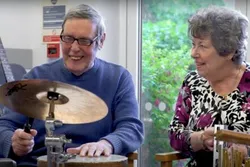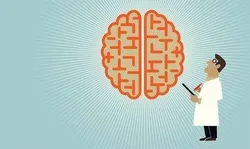
An Introduction to the Nordoff Robbins approach to Music Therapy 
This course introduces the Nordoff Robbins approach to Music Therapy, a person-centered approach that uses music to help people in a variety of settings. It explores the key elements of how music therapy works and how it can be used to build relationships and improve wellbeing. Participants will gain an understanding of the Nordoff Robbins approach and how it can be used to help people. ▼
ADVERTISEMENT
Course Feature
![]() Cost:
Cost:
Free
![]() Provider:
Provider:
Futurelearn
![]() Certificate:
Certificate:
Paid Certification
![]() Language:
Language:
English
![]() Start Date:
Start Date:
Self paced
Course Overview
❗The content presented here is sourced directly from Futurelearn platform. For comprehensive course details, including enrollment information, simply click on the 'Go to class' link on our website.
Updated in [March 06th, 2023]
This six-week course provides an introduction to the Nordoff Robbins approach to music therapy. Participants will gain an understanding of how music therapy works today, and how the practice has developed over the last half-century. Through exploring their own relationship with music, they will discover the key elements of how music therapy works and can help in a range of settings. The course will also cover the pioneering work of Paul Nordoff and Clive Robbins, the current work of Nordoff Robbins UK, the importance of music-making, the role of groups and communities, and the worldwide impact of the work from the UK’s largest independent provider of music therapy. Additionally, participants will develop the skills of a music therapist, such as the importance of listening, and explore therapeutic development through shared music therapy case studies. No prior experience is necessary to join this introductory course. Participants will need to be able to access the course through their computer or mobile device, and it is recommended that they use a ‘reflective journal’ to make their own notes.
[Applications]
Upon completion of this course, participants can apply their knowledge of the Nordoff Robbins approach to music therapy by exploring their own relationship with music, understanding the key elements of how music therapy works, and developing the skills of a music therapist. Additionally, participants can use their newfound knowledge to help others in a range of settings, and to make a positive impact in their communities.
[Career Paths]
Job Position Paths:
1. Music Therapist: Music therapists use music to help people of all ages and abilities to improve their physical, emotional, cognitive, and social functioning. Music therapists assess the needs of their clients and develop individualized treatment plans to help them reach their goals. They use a variety of techniques, such as improvisation, songwriting, and music listening, to help their clients. Music therapists must have a master's degree in music therapy and must be certified by the Certification Board for Music Therapists. The demand for music therapists is expected to grow in the coming years as more people become aware of the benefits of music therapy.
2. Music Therapy Educator: Music therapy educators are responsible for teaching music therapy students the skills and knowledge they need to become successful music therapists. They teach courses in music therapy theory, research, and practice, as well as courses in music theory, music history, and music technology. Music therapy educators must have a master's degree in music therapy and must be certified by the Certification Board for Music Therapists. The demand for music therapy educators is expected to grow in the coming years as more people become aware of the benefits of music therapy.
3. Music Therapy Researcher: Music therapy researchers are responsible for conducting research on the effectiveness of music therapy. They design and conduct studies to evaluate the effectiveness of music therapy interventions, and they analyze the data to determine the impact of music therapy on individuals and populations. Music therapy researchers must have a master's degree in music therapy and must be certified by the Certification Board for Music Therapists. The demand for music therapy researchers is expected to grow in the coming years as more people become aware of the benefits of music therapy.
4. Music Therapy Administrator: Music therapy administrators are responsible for managing the day-to-day operations of music therapy programs. They oversee the budget, staff, and resources of the program, and they ensure that the program is meeting its goals and objectives. Music therapy administrators must have a master's degree in music therapy and must be certified by the Certification Board for Music Therapists. The demand for music therapy administrators is expected to grow in the coming years as more people become aware of the benefits of music therapy.
[Education Paths]
Recommended Degree Paths:
1. Bachelor of Music Therapy: This degree program provides students with the knowledge and skills necessary to become a professional music therapist. Students will learn about the history and theory of music therapy, as well as the practical application of music therapy techniques. This degree is becoming increasingly popular as more people recognize the therapeutic benefits of music.
2. Master of Music Therapy: This degree program is designed for those who have already completed a Bachelor of Music Therapy and want to further their education. Students will learn more advanced techniques and theories of music therapy, as well as gain experience in clinical settings. This degree is becoming increasingly popular as more people recognize the therapeutic benefits of music.
3. Doctor of Music Therapy: This degree program is designed for those who have already completed a Master of Music Therapy and want to further their education. Students will learn more advanced techniques and theories of music therapy, as well as gain experience in clinical settings. This degree is becoming increasingly popular as more people recognize the therapeutic benefits of music.
Developing Trends:
1. Technology: Music therapy is increasingly being used in combination with technology, such as virtual reality, to create immersive experiences for clients. This is allowing music therapists to reach more people and provide more effective treatments.
2. Research: Music therapy is becoming more widely accepted as a legitimate form of therapy, and research is being conducted to further understand its effects. This research is helping to further legitimize music therapy and its use in clinical settings.
3. Interdisciplinary: Music therapy is increasingly being used in combination with other forms of therapy, such as cognitive behavioral therapy, to create more effective treatments. This interdisciplinary approach is allowing music therapists to reach more people and provide more effective treatments.
Course Syllabus
Introduction - Music and You
What is effective learning?The importance of listening
How do you experience music?The History of Nordoff Robbins
How can music be therapeutic?It takes two...
Why do we respond to music?Nordoff Robbins work in groups and community settings
Welcome to Week 2Conclusion
How we observe music therapy - Mary and AntoniaCourse Provider

Provider Futurelearn's Stats at AZClass
An Introduction to the Nordoff Robbins approach to Music Therapy presents the Nordof-Robbins approach to music therapy, a person-centered approach that uses music to help people in a variety of settings. It explores key elements of how music therapy works, and how it can be used to build relationships and improve well-being. This introductory six-week course will help you explore music therapy through a Nudolph Robbins-centered approach. You'll learn how music therapy works today, and how the therapy has evolved over the past half century.
Discussion and Reviews
0.0 (Based on 0 reviews)
Explore Similar Online Courses

Behavioral Neuroscience: Foundations of Compulsive Behaviors

Machine Learning

Python for Informatics: Exploring Information

Social Network Analysis

Introduction to Systematic Review and Meta-Analysis

The Analytics Edge

DCO042 - Python For Informatics

Causal Diagrams: Draw Your Assumptions Before Your Conclusions

Whole genome sequencing of bacterial genomes - tools and applications

Meditation

Mental Health First Aid Skills -


Start your review of An Introduction to the Nordoff Robbins approach to Music Therapy